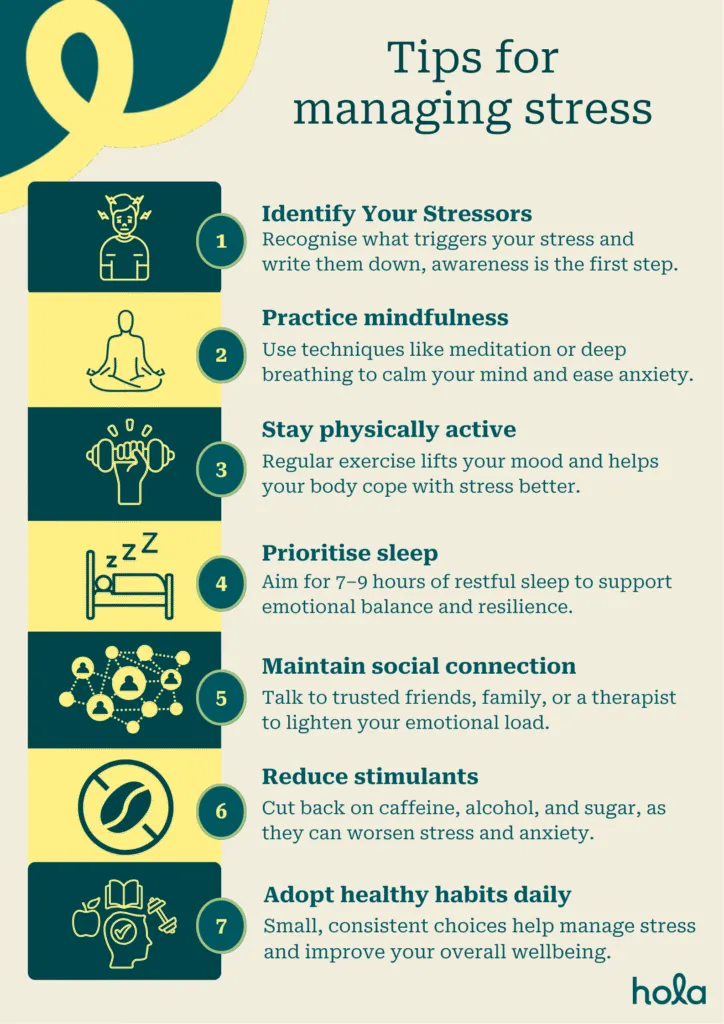What are signs of extreme stress and what to do?
Written by editorial staff writer at Hola. Medically reviewed by Amira Shah, MA in Counselling Psychology, Registered Psychotherapist.

Contents

Summary: Severe stress impacts both the mind and body, manifesting as emotional, physical, and behavioural symptoms. Early identification of these signs is key. Managing stress involves self-care seeking help, staying active, and setting healthy boundaries. You can regain balance and lead a calmer, healthier life with the right steps.
Stress is a common experience for everyone, but when it intensifies to extreme levels, it can feel like you’re juggling fire while on a rollercoaster. While a little stress can keep us motivated, excessive stress can seriously disrupt our mental and physical health. In fact, in 2020-21, 15% of Australians aged 16 to 85 experienced high or very high levels of psychological distress—a clear sign that this is more common than we think.
Recognising the signs of extreme stress early on can help prevent bigger problems. So, let’s dive into the common signs of extreme stress and discover how to restore balance before it takes control of your life.
How do I know if I'm too stressed?
Feeling constantly on edge or drained? Stress might be taking a bigger toll than you realise. Here is a quick guide to help you recognise if you’re too stressed:1. Mental and emotional signs:
- Anxiety
- Depression
- Difficulty concentrating or making decisions
- Feeling unmotivated or hopeless
- Irritability
- Mood swings
- Emotional numbness
- Feeling overwhelmed
- Racing thoughts or constant worry
2. Behavioural signs:
- Trouble sleeping or sleeping too much
- Changes in appetite
- Procrastination or avoiding responsibilities
- Withdrawing from social activities
- Increased use of caffeine, alcohol, or drugs
3. Physical signs:
- Frequent headaches or muscle tension
- Gastrointestinal problems
- Fatigue or low energy
- Skin conditions like eczema, psoriasis, or acne
- Rapid heartbeat or chest pain
- Weakened immune system
Ready for positive change? Start your mental health care plan here.
Book an appointment
Fully bulk-billed, across Australia.
When should I call my doctor?
If stress disrupts your everyday life or feels overwhelming and difficult to manage, consult a doctor. Signs to look out for include persistent anxiety, sleep disturbances (insomnia or excessive sleeping), increased irritability, difficulty concentrating, unexplained chest discomfort, persistent fatigue, or significant changes in appetite. if stress begins affecting your job performance, relationships, or daily functioning, seek professional help immediately. Don't postpone until a crisis occurs, contacting someone early can help you control stress before it develops into a more serious health issue.Mental health plan for extreme stress
A comprehensive mental health plan for severe stress involves a systematic approach designed by a healthcare provider, typically your general practitioner. This process starts with a thorough assessment of your mental health requirements, which includes pinpointing stressors, physical symptoms, and emotional reactions. Following this, your doctor may refer you to a psychologist or counsellor and create a treatment strategy that could include evidence-based therapies (such as cognitive behavioral therapy), lifestyle modifications, mindfulness exercises, and possibly medications. You might also qualify for Medicare or insurance-covered sessions to make therapy more accessible. The plan establishes specific objectives and monitors your progress, ensuring that you receive ongoing support. Possessing a mental health care plan equips you with resources, support, and expert advice to manage stress successfully and safeguard your long-term wellbeing.Tips for managing stress
[caption id="attachment_80151" align="aligncenter" width="724"] Tips for managing stress[/caption]
Stress is an unavoidable aspect of life, but when it becomes excessive or chronic, it can significantly affect your mental and physical health. Developing effective stress management strategies can enhance your overall health, increase resilience, and help you feel more in control. Whether it stems from work, relationships, or personal issues, these practical strategies can assist you in coping better and diminishing its effects on your daily life:
Tips for managing stress[/caption]
Stress is an unavoidable aspect of life, but when it becomes excessive or chronic, it can significantly affect your mental and physical health. Developing effective stress management strategies can enhance your overall health, increase resilience, and help you feel more in control. Whether it stems from work, relationships, or personal issues, these practical strategies can assist you in coping better and diminishing its effects on your daily life:
- Identify your stressors: Acknowledge what triggers your stress, be it workload, relationships, or financial matters and jot them down. Awareness is the initial step toward management.
- Engage in mindfulness: Techniques like deep breathing, meditation, or simply focusing on the present can aid in calming your mind and alleviating anxiety.
- Stay physically active. Consistent exercise boosts endorphin levels, elevates mood, and enables the body to manage stress more effectively.
- Prioritise sleep: Strive for 7-9 hours of quality sleep. Inadequate sleep heightens stress levels and hampers emotional regulation.
- Maintain connections: Opening up to trusted friends, family, or a therapist can lighten the emotional load and provide support.
- Reduce stimulants: Limit your intake of caffeine, alcohol, and sugar, as these can exacerbate stress and anxiety.
Take control of your mental health. Begin your care plan now.
Book an appointment
Fully bulk-billed, across Australia.
What we treat
- Cough
- Nausea & vomiting
- Fever
- Hayfever
- Fatigue
- Sore throat
- Acne
- Hair loss
- Gout
- Eczema
- Rosacea
- Sunburn
- UTI
- Erectile dysfunction
- Contraception
- Morning sickness
- Morning after pill
- Prostate health
- Anxiety
- Depression
- Stress
- Grief & loss
- Antidepressants
- Premature ejaculation
- Asthma
- Blood pressure
- Blood thinners
- Diabetes
- Cholesterol
- Migraines & headaches
- Allergies
- Body ache
- Heartburn & reflux
- Sleep disorder
- Pain relief
- Gastro
Related Articles
What To Say To Doctor To Get Stress Leave Australia?
January 29, 2026Mental Health
What To Say To Doctor To Get Stress Leave Australia? Written by Priyanka Agarwal, Writer...
Disclaimer
This blog is for general informational purposes only and does not indicate that Hola Health provides all treatments or preventive measures mentioned. It is not intended to be a substitute for professional medical advice. Always seek the guidance of your doctor or other qualified health professional with any questions you may have regarding your health or a medical condition. For emergencies please immediately contact 000. Any medical topics discussed are intended to educate, not to imply availability through Hola Health.
 Facebook
Facebook  X
X  Copy Link
Copy Link



